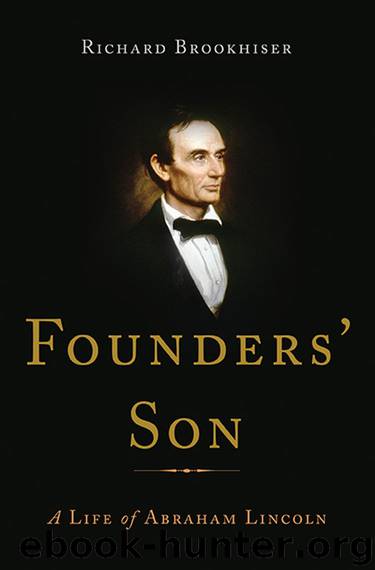Founders' Son: A Life of Abraham Lincoln by Richard Brookhiser

Author:Richard Brookhiser [Brookhiser, Richard]
Format: epub
ISBN: 9780465056866
Publisher: Perseus Books, LLC
Eleven
THE ELECTION OF 1860. THE TOWERING GENIUS (II)
THE COOPER UNION ADDRESS KICKED OFF LINCOLN’S RUN for the White House; the next fourteen months were consumed with presidential politics and presidential responsibilities. But even in this rush the founders appeared in his thoughts, speeches, and jokes, and in the speeches of his rivals; they were by now woven into his life.
Presidential contests in Lincoln’s lifetime were much shorter than they are today. The nomination struggles that now take place over a months-long parade of caucuses and primaries were then compressed into a day, at worst two, of balloting at political conventions. The campaigns that followed were also, in one respect, quieter. Would-be candidates might set themselves up with significant speeches before the contest formally began; Lincoln could point to a string of them going back six years. But once nominations were made, candidates were expected to maintain a dignified silence, while their supporters maintained a raucous hoopla in their behalf.
Despite his new prominence, Lincoln was not among the front-runners for the Republican nomination in 1860. The leader among the leaders was William Seward. Besides a long career and a base in the nation’s largest state, Seward was blessed with a winning personality, genial and charming. He was one of those men on whom fortune smiled, and who smiled back. But even the blessed acquire enemies in politics. Horace Greeley, who had long yearned to run for office himself in New York without a hint of encouragement from Seward, had become one such (one reason he had puffed the Cooper Union speech was simply to spite Seward).
Seward was also weighed down by one of his convictions. The Republican Party was a coalition of disparate elements, united by the issue of slavery expansion. As Lincoln had put it in the “House Divided” speech, “we gathered from the four winds.” Among the disparate elements were antislavery veterans of the American or Know-Nothing Party, which had flourished and died in the mid-1850s. But Seward was boldly pro-immigrant, going so far in his days as governor of New York to call for state support of Catholic schools. No nativist could ever be comfortable with him.
The opposite drawback affected Edward Bates, an elderly lawyer and politician from Missouri. Bates might give the Republicans clout in the border states, and Greeley (whatever nice things he said about the Cooper Union speech) backed Bates for the nomination for that reason. But Bates had backed the American Party in 1856, and German Americans, who were a mainstay of the Republican Party in the Midwest, would not forgive him for it.
Salmon Portland Chase had been the first Republican governor of Ohio, and Ohio was the third-largest state in the country. Chase was intelligent, energetic, and idealistic—his opposition to slavery had taken him into the Liberty and Free Soil parties in the 1840s, before he became a Free Soil Democrat, then a Republican. But he was both humorless and sharp-elbowed. His rise to office in Ohio had left a trail of bruised competitors.
Download
This site does not store any files on its server. We only index and link to content provided by other sites. Please contact the content providers to delete copyright contents if any and email us, we'll remove relevant links or contents immediately.
| Afghan & Iraq Wars | American Civil War |
| American Revolution | Vietnam War |
| World War I | World War II |
Waking Up in Heaven: A True Story of Brokenness, Heaven, and Life Again by McVea Crystal & Tresniowski Alex(36998)
Empire of the Sikhs by Patwant Singh(22163)
We're Going to Need More Wine by Gabrielle Union(18063)
Hans Sturm: A Soldier's Odyssey on the Eastern Front by Gordon Williamson(16552)
Leonardo da Vinci by Walter Isaacson(11893)
The Radium Girls by Kate Moore(10901)
Educated by Tara Westover(7055)
Tools of Titans by Timothy Ferriss(6933)
How to Be a Bawse: A Guide to Conquering Life by Lilly Singh(6686)
The Last Black Unicorn by Tiffany Haddish(5065)
Permanent Record by Edward Snowden(4986)
The Rise and Fall of Senator Joe McCarthy by James Cross Giblin(4839)
Promise Me, Dad by Joe Biden(4439)
The Wind in My Hair by Masih Alinejad(4420)
The Crown by Robert Lacey(4098)
A Higher Loyalty: Truth, Lies, and Leadership by James Comey(4024)
The Iron Duke by The Iron Duke(3634)
Joan of Arc by Mary Gordon(3252)
How to be Champion: My Autobiography by Sarah Millican(3180)
